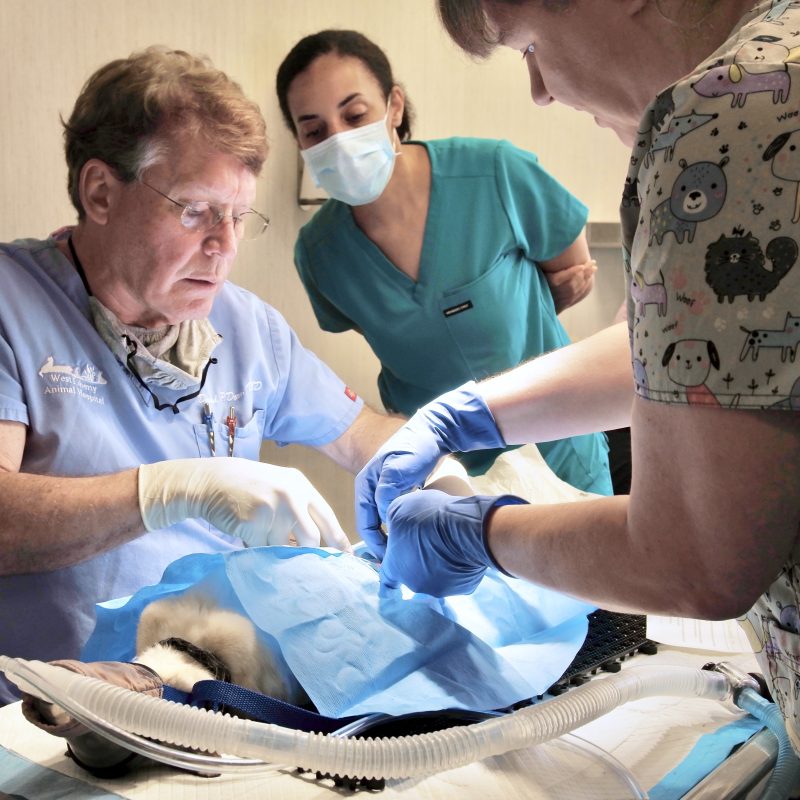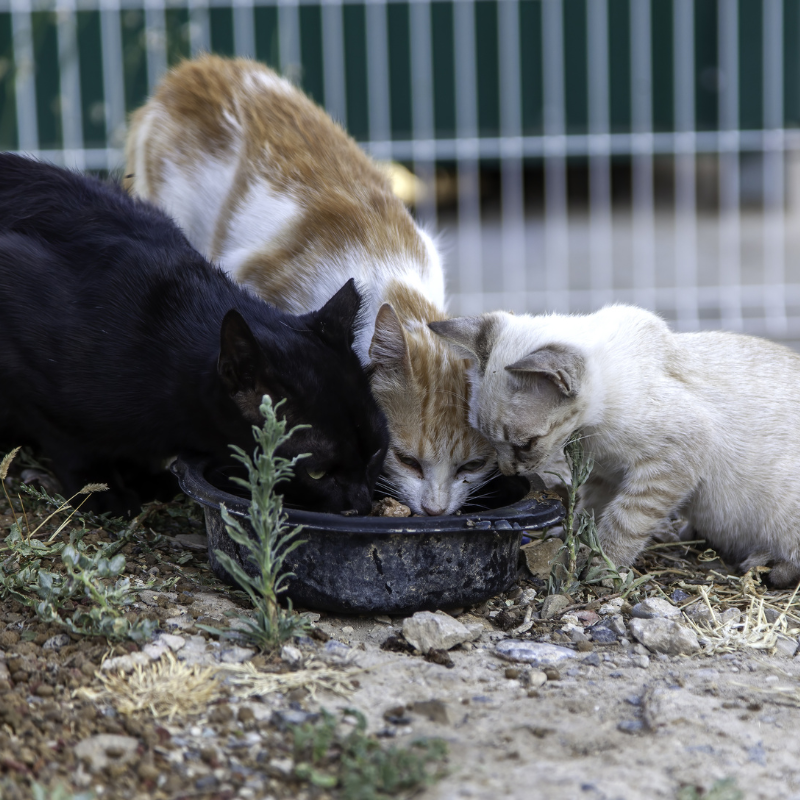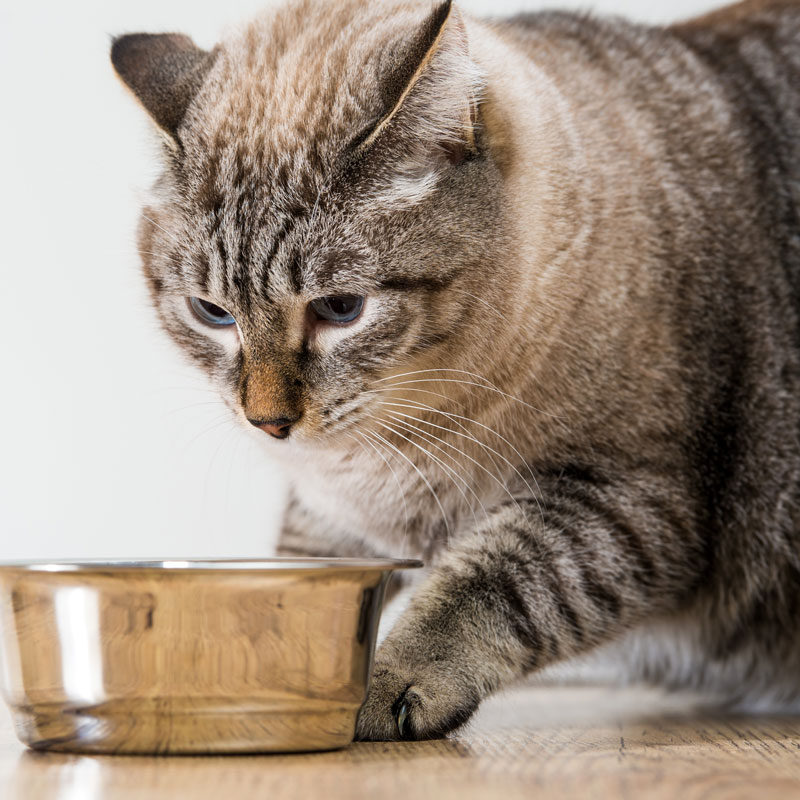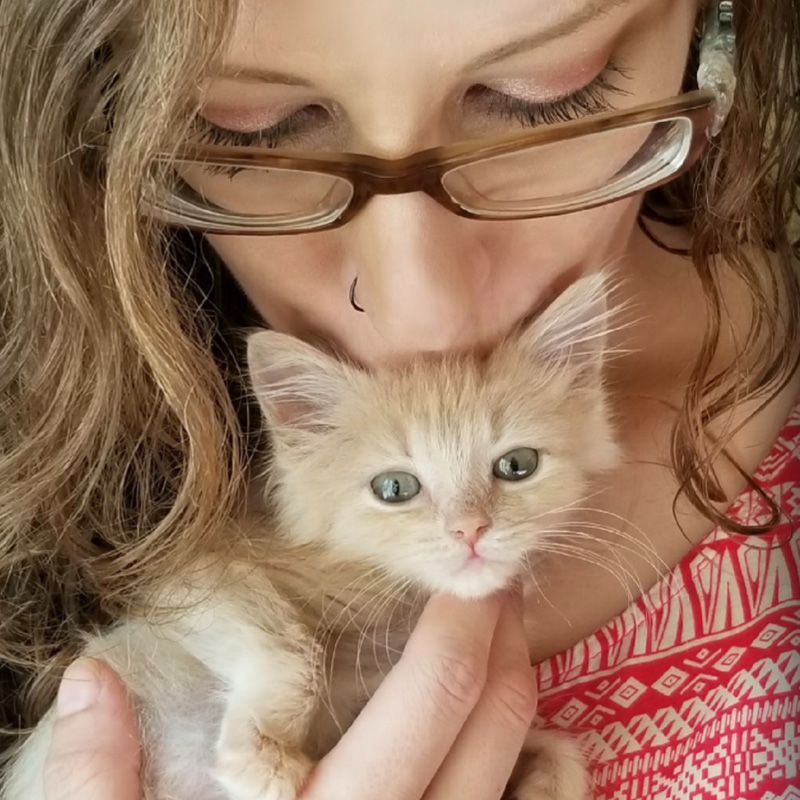
Mary Chromek, Neonatal Kitten Foster
July 13, 2019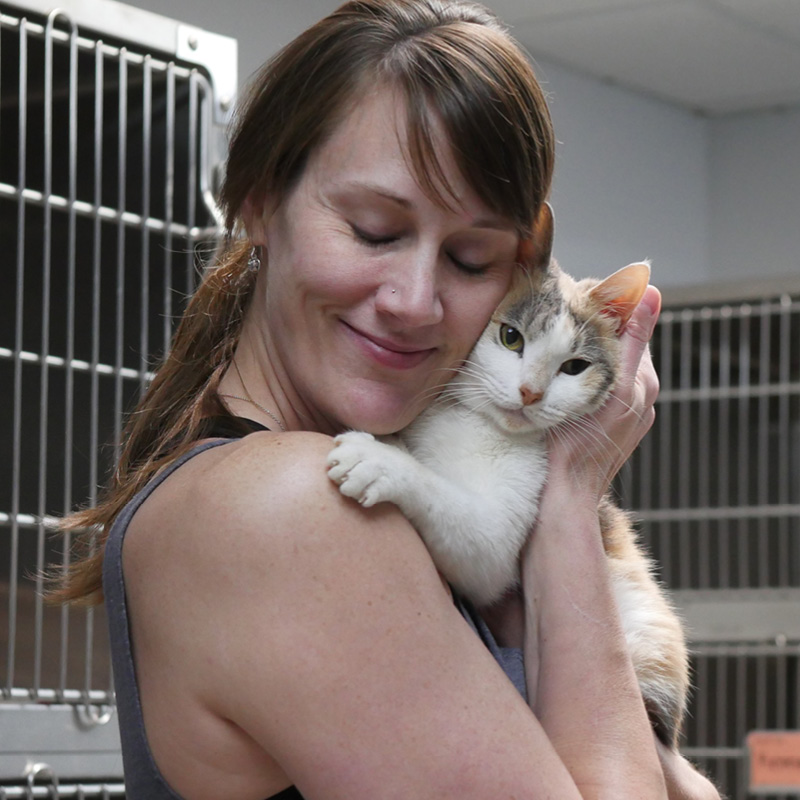
Amanda Jones, Founder and CEO of Sunshine Kitty Catfe
July 20, 2019
Today’s post comes from guest blogger Allison Hunter-Frederick, a pet blogger, cat consultant, and cat trainer. Allison is also mom to three rescue cats. This post originally appeared on Allison’s blog site, Lincoln Pet Culture. We thought it was so great that we reached out to Allison to ask if we could share (and she said yes)!
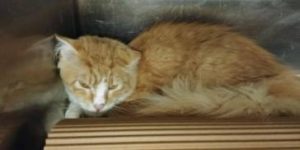
Cooper prior to adoption.
Until Elaine Capps adopted Cooper in August of 2018, Cooper had spent most of his life in a cage at an animal shelter. Now ten months old, the orange and white kitten was adopted briefly when he was three months old but was returned because he was considered not cuddly enough.
Capps had a different impression of Cooper. “This guy stole my heart from the start!” she exclaimed. “Cooper wasn’t afraid of anything. He lived life with such enthusiasm and didn’t waste a minute of it. He loved the barn and outdoor living, but he also became a house cat. He spent a good share of his nights cuddled up next to me.”
Living in confinement, in Capps’s view, had made Cooper aggressive. In fact, when the family adopted him in August 2018, Cooper had already bitten several people. Capps jokes that Cooper could have been “the Nasty Cat Poster Child.”
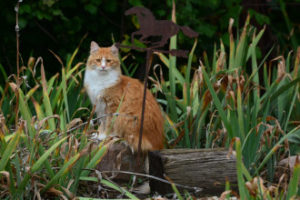
Cooper
Yet Capps believes that Cooper was a good cat at heart and had simply been misunderstood. “Cooper never wanted to be in trouble,” Capps explained. “He was such a positive individual. He got along with our cats; they all liked him. He did everything I ever asked of him; all I had to do was ask.”
In the few months that the “sweet and gorgeous” Cooper had energized the lives of the Capps, Capps feels that Cooper did everything he could have ever imagined. He caught mice, climbed trees and roofs, played in boxes, enjoyed being pulled around the house on a throw rug (which Capps calls “riding the magic carpet”) and joined Capps and several of her pets on hikes.
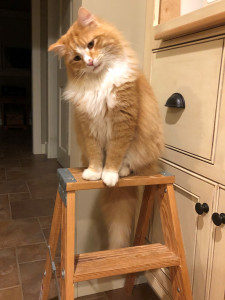
Cooper
Sadly, his life came to an end all too soon when he lost his battle with chronic kidney disease in April 2019. “I miss him terribly,” Capps shared. “I suspect I will for a long time. Cooper was a once-in-a-lifetime experience.”
Despite her grief, Capps doesn’t regret adopting Cooper. “I’ve thought and re-thought it so many times,” said Capps, “and it always comes out the same. I wouldn’t have changed a thing. What if I’d not have gotten him? Cooper may have died in that cage, and what a terrible shame that would have been. For Cooper and for us. Cooper would never have had a life, and we would never have had the incredible ‘Cooper Experience.’”
A long-time animal lover, Capps grew up on a farm, surrounded by cows, pigs, chickens, dogs, and cats. She’s always been fascinated by animal behaviors and “Why do animals do what they do?” Since 1970, Capps has trained dogs through the Greater Lincoln Obedience [Club]. She also started riding horses at about the same time and said that her riding discipline of dressage taught her about a lot about animal psychology. In addition, Capps loves cats, their personalities, their complexities, and their uniqueness.
Cooper took Capps’s interest in cats in a new direction by awakening in her a fascination with aggressive cats that she hadn’t had previously. She explained, “My thought is that since I can only take in a limited number of cats, if I take the most aggressive ones, which fewer people want, maybe my efforts can make a bigger dent.”
Capps adopted Cooper through the Joining Forces Saving Lives barn program, a program which she believes is essential to the Lincoln community. “There are so many cats who can benefit from it,” Capps said. “Not simply as a place to put the overflow of cats we can’t find homes for, but instead as a place for the frustrated, stressed out angry cats. A barn program can be a sanctuary where they can unwind and become themselves again.”
She believes that often these cats try to communicate what they need but are not listened to by people. Instead, no one asks what they want, and decisions are made for them, which causes them frustration. “Out in the country where we are,” Capps said, “cats don’t need to be confined in any way, so there’s no need for aggression. Instead, they can just walk away. They get to live life on their own terms. Once they realize this, life starts looking a whole lot better!”
In addition to a barn program, Capps believes there are other ways to help challenging cats. Foremost is education. According to Capps, cat owners and prospective owners need to be better informed. There needs to be more and better understanding of cats, with a focus on seeing things from the cat’s perspective. She thinks there should be classes that teach people how to keep indoor cats. The next way we can help challenging cats, Capps believes, is to improve the screening of adoption applicants. According to Capps, this can be achieved by matching a cat’s temperament and energy level to the needs of [and] experience level of applicants for a better cat/human compatibility match. “The barn cat program comes into play ‘after the fact,’” Capps emphasized. “We need to be pro-active with the lives we provide these cats so they never become aggressive in the first place.”
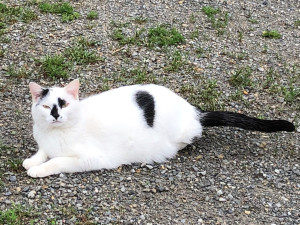
Willow
Cooper wasn’t Elaine’s only experience with the Joining Forces Saving Lives barn cat program. At the same time that Capps adopted Cooper, she adopted Willow. Both cats had been caged at the shelter for a long time and labeled as aggressive biters.
Two-year-old Willow, who had come from a bullying situation in a multi-cat household, still lives with Capps. “She was unadoptable because she bit and scratched when anyone reached in to clean her cage,” Capps explained.
As with Cooper, life on the Capps’ farm brought out a different side of Willow. “The Willow we know is an elegant and ‘proper’ lady. She’s never been anything but sweet and affectionate toward my husband and me. She was just afraid, mostly of other cats.”
According to Capps, it took a couple of months for Willow to muster up the courage to venture outside the barn. Exploring “the great outdoors” of their barnyard, Willow gained confidence. Capps says that today Willow is brave and outgoing. “She runs to greet us each morning as we enter the barn and loves to have her back scratched.”
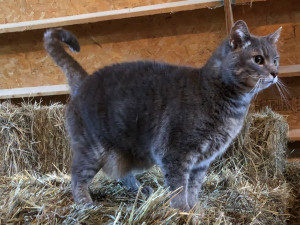
Pearl
Capps’s dream is to open her home to even more rejected cats so that they that too will live happy lives. Just this past spring, Capps accepted a second pair of barn cats: Pearl and Punky Brewster. Pearl is a two- or three-year-old solid grey cat, deemed unadoptable because she bites unexpectedly when petted. Despite this, Capps says she’s a hoot to play with and would do wonderful in a home with no other cats. Punky Brewster is an aggressive nine-year-old female. “I’m so looking forward to seeing her emerge from her shell,” Capps said, “and getting acquainted with the real Punky Brewster. So far, things are looking good!”
In 2018, Joining Forces Saving Lives received a Working/Barn Cat Grant from Maddie’s Fund. This grant will provide the adoption fees for 100 unadoptable cats to be placed on farms or in businesses. Each caretaker of a Working/Barn Cat must agree to provide a warm and dry shelter, daily food and water, and a confined place to acclimate to their new home for two weeks. The cats will keep the adopter’s property rodent-free naturally in exchange for daily food, water, and shelter. If you wish to join Capps and others in giving cats a second chance, please contact Joining Forces Saving Lives.

